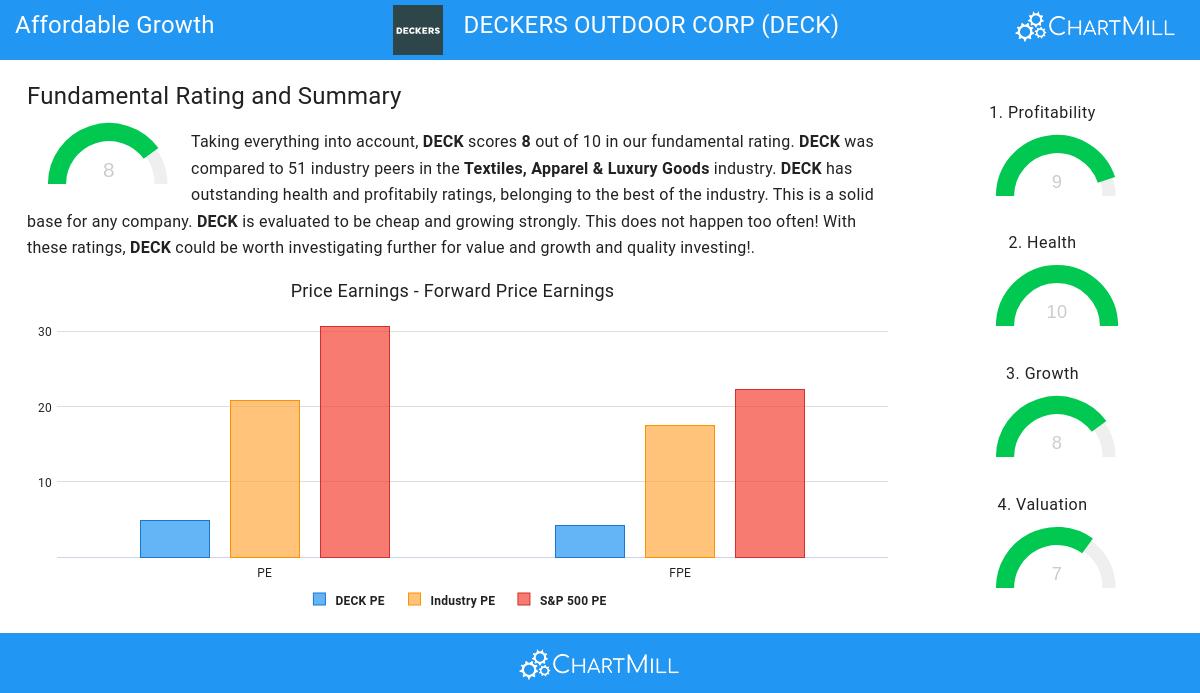
Investors should take note of NYSE:DECK, a growth stock that remains attractively priced.
By Mill Chart
Last update: Sep 24, 2024
Here's DECKERS OUTDOOR CORP (NYSE:DECK) for you, a growth stock our stock screener believes is undervalued. NYSE:DECK is scoring impressively in terms of growth while demonstrating strong financials. On top of that, it remains attractively priced. Let's break it down further.

Understanding NYSE:DECK's Growth
ChartMill assigns a Growth Rating to each stock, ranging from 0 to 10. This rating is determined by analyzing different growth elements, including EPS and revenue growth, spanning both historical and future figures. In the case of NYSE:DECK, the assigned 8 reflects its growth potential:
- The Earnings Per Share has grown by an impressive 55.83% over the past year.
- The Earnings Per Share has been growing by 27.07% on average over the past years. This is a very strong growth
- Looking at the last year, DECK shows a very strong growth in Revenue. The Revenue has grown by 20.30%.
- The Revenue has been growing by 16.24% on average over the past years. This is quite good.
- The Earnings Per Share is expected to grow by 14.54% on average over the next years. This is quite good.
- DECK is expected to show quite a strong growth in Revenue. In the coming years, the Revenue will grow by 10.42% yearly.
Deciphering NYSE:DECK's Valuation Rating
ChartMill assigns a proprietary Valuation Rating to each stock. The score is computed by evaluating various valuation aspects, like price to earnings and free cash flow, both absolutely as relative to the market and industry. NYSE:DECK was assigned a score of 7 for valuation:
- DECK is valuated cheaply with a Price/Earnings ratio of 4.91.
- DECK's Price/Earnings ratio is rather cheap when compared to the industry. DECK is cheaper than 98.00% of the companies in the same industry.
- Compared to an average S&P500 Price/Earnings ratio of 30.69, DECK is valued rather cheaply.
- With a Price/Forward Earnings ratio of 4.18, the valuation of DECK can be described as very cheap.
- Based on the Price/Forward Earnings ratio, DECK is valued cheaply inside the industry as 100.00% of the companies are valued more expensively.
- When comparing the Price/Forward Earnings ratio of DECK to the average of the S&P500 Index (22.27), we can say DECK is valued rather cheaply.
- DECK's low PEG Ratio(NY), which compensates the Price/Earnings for growth, indicates a rather cheap valuation of the company.
- DECK has an outstanding profitability rating, which may justify a higher PE ratio.
- A more expensive valuation may be justified as DECK's earnings are expected to grow with 14.27% in the coming years.
Health Analysis for NYSE:DECK
ChartMill employs its own Health Rating for stock assessment. This rating, ranging from 0 to 10, is calculated by examining various liquidity and solvency ratios. In the case of NYSE:DECK, the assigned 10 reflects its health status:
- DECK has an Altman-Z score of 15.20. This indicates that DECK is financially healthy and has little risk of bankruptcy at the moment.
- DECK has a Altman-Z score of 15.20. This is amongst the best in the industry. DECK outperforms 100.00% of its industry peers.
- DECK has no outstanding debt. Therefor its Debt/Equity and Debt/FCF ratios are 0 and belong to the best of the industry.
- DECK has a Current Ratio of 2.86. This indicates that DECK is financially healthy and has no problem in meeting its short term obligations.
- With a decent Current ratio value of 2.86, DECK is doing good in the industry, outperforming 70.00% of the companies in the same industry.
- A Quick Ratio of 2.04 indicates that DECK has no problem at all paying its short term obligations.
- DECK has a better Quick ratio (2.04) than 86.00% of its industry peers.
A Closer Look at Profitability for NYSE:DECK
Discover ChartMill's exclusive Profitability Rating, a proprietary metric that assesses stocks on a scale of 0 to 10. It takes into consideration various profitability ratios and margins, both in absolute terms and relative to industry peers. Notably, NYSE:DECK has achieved a 9:
- With an excellent Return On Assets value of 24.55%, DECK belongs to the best of the industry, outperforming 98.00% of the companies in the same industry.
- Looking at the Return On Equity, with a value of 39.12%, DECK belongs to the top of the industry, outperforming 92.00% of the companies in the same industry.
- Looking at the Return On Invested Capital, with a value of 32.34%, DECK belongs to the top of the industry, outperforming 98.00% of the companies in the same industry.
- Measured over the past 3 years, the Average Return On Invested Capital for DECK is significantly above the industry average of 11.96%.
- The last Return On Invested Capital (32.34%) for DECK is above the 3 year average (26.49%), which is a sign of increasing profitability.
- DECK has a Profit Margin of 18.29%. This is amongst the best in the industry. DECK outperforms 98.00% of its industry peers.
- DECK's Profit Margin has improved in the last couple of years.
- Looking at the Operating Margin, with a value of 22.49%, DECK belongs to the top of the industry, outperforming 96.00% of the companies in the same industry.
- In the last couple of years the Operating Margin of DECK has grown nicely.
- Looking at the Gross Margin, with a value of 56.54%, DECK is in the better half of the industry, outperforming 72.00% of the companies in the same industry.
- In the last couple of years the Gross Margin of DECK has grown nicely.
Our Affordable Growth screener lists more Affordable Growth stocks and is updated daily.
Check the latest full fundamental report of DECK for a complete fundamental analysis.
Disclaimer
Important Note: The content of this article is not intended as trading advice. It is essential to perform your own analysis and exercise caution when making trading decisions. The article presents observations created by automated analysis but does not guarantee any trading or investment outcomes. Always trade responsibly and make independent judgments.
NYSE:DECK (1/14/2026, 11:31:47 AM)
100.914
-0.8 (-0.78%)
Find more stocks in the Stock Screener






